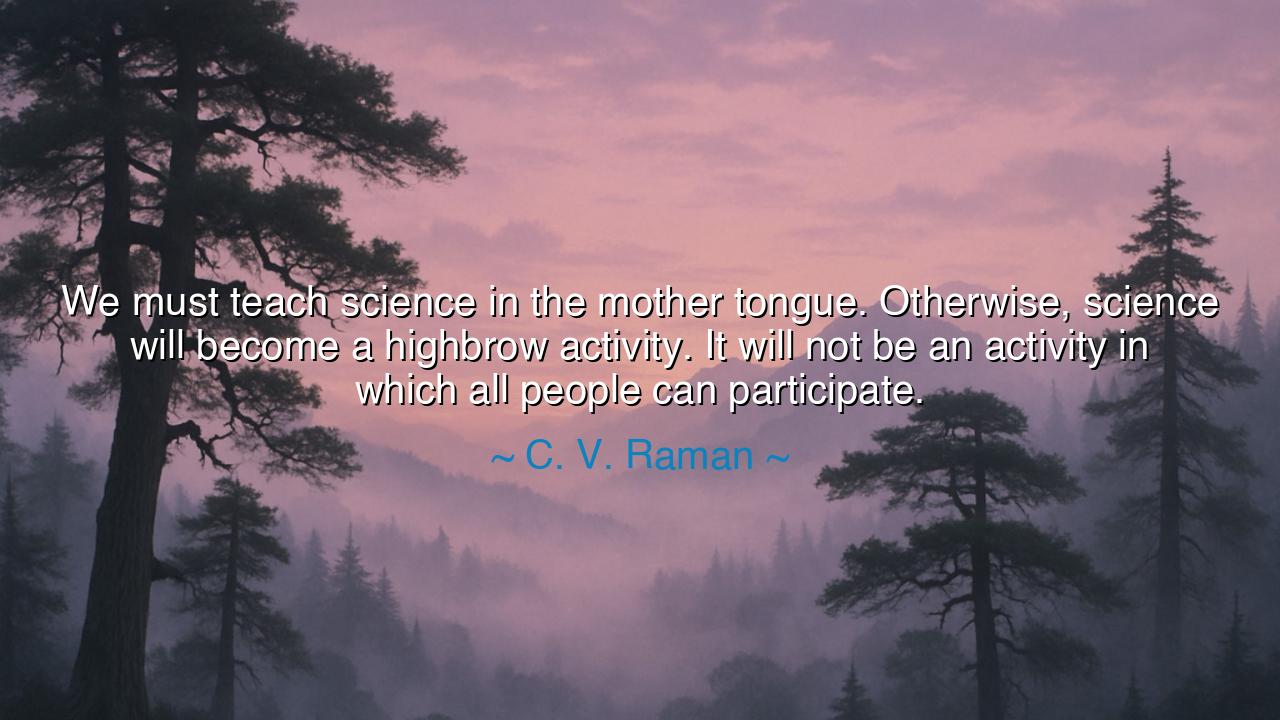
We must teach science in the mother tongue. Otherwise, science
We must teach science in the mother tongue. Otherwise, science will become a highbrow activity. It will not be an activity in which all people can participate.






Hear, O children of the world, for there is wisdom in the words of the great C. V. Raman, whose life and work illuminated the path of science. He speaks to us of a truth that transcends time, a truth that binds us all in the pursuit of knowledge. "We must teach science in the mother tongue," he declares, "Otherwise, science will become a highbrow activity. It will not be an activity in which all people can participate." These words carry with them the essence of humanity's most noble endeavor—the search for truth and understanding. But they also carry a warning, a call to action, for the pursuit of science cannot and must not be reserved for the elite. Knowledge is the inheritance of all, not just the few, and it must be shared in the language of the people.
Let us consider, O seekers of wisdom, the power of language. Language is the vessel that carries thought, the bridge between the heart of one and the mind of another. To speak in a language that is foreign to the people is to build a wall between them and the wonders of the world. The language of science, when spoken in the tongues of those who do not understand, becomes a mysterious force, distant and detached. But when spoken in the mother tongue, the language of the people, it becomes accessible, it becomes personal. Science, in its truest form, is not just an academic pursuit, but a shared experience, a journey that all can take, not just those who possess the tools of the scholar.
In the time of the great Socrates, the philosopher did not speak in riddles or in a tongue that was foreign to his people. He spoke in the language of the common man, the language that bridged the gap between the scholar and the laborer. His wisdom was not hidden behind layers of obscure words, but shared openly, for the benefit of all who were willing to listen. And so it must be with science. Raman understood this deeply—he saw that the discovery of nature’s secrets must be accessible to every soul, from the highest king to the humblest peasant. Science cannot be something aloof and distant, something that belongs only to those with the privilege of an education. It must be part of the very fabric of society, woven into the lives of all people.
Reflect, O children, on the example of Isaac Newton, the great genius who unlocked the laws of the universe. Newton's works were not written in some foreign tongue, but in the language of the common people of his time. His Principia Mathematica became a cornerstone of human knowledge because it spoke to all who sought to understand the world, not just the learned few. Newton did not make science an exclusive club, but rather an invitation to all who were willing to look up at the stars and ask questions. Through his words, science became a universal pursuit, open to anyone with the desire to learn.
Now, let us consider the very real world we live in today. Science has made great strides, but too often, it is cloaked in the complex language of academia, becoming something distant and inaccessible to those who need it most. Raman's warning rings louder in the modern world: If we teach science only in the language of the elite, we risk creating a chasm between the knowledge we possess and the people who need it. Language is the key that opens the doors to understanding. When the wisdom of science is shared in the mother tongue, it becomes a part of the people’s lives, a tool they can use to improve their world, a treasure that belongs to everyone.
The lesson that Raman imparts is clear and urgent: we must make science a language for all, a pursuit that belongs to every person, not just the privileged few. If we are to unlock the true potential of our society, then science must be taught in the language of the people, for only then will it be an activity in which all can participate. Imagine, O children, a world where every person, regardless of their station, can understand and engage with the wonders of nature, where the secrets of the stars and the mysteries of life are shared in a language that is close to their hearts. This is the world that C. V. Raman envisioned—a world where knowledge is not hoarded, but shared freely.
Thus, take up this truth, O seekers of wisdom. As you journey through life, remember that knowledge is not a gift for the few, but a treasure for the many. Strive to learn and to teach in the language of your people, for only then will you help build a world where science is a common good—not an elitist pursuit, but a collective endeavor that elevates the whole of humanity. Speak the language of the heart, and let the wonders of the natural world be known by all. In doing so, you will not just spread knowledge, but empower others, and in that empowerment, you will help build a brighter, more enlightened future for all.






AAdministratorAdministrator
Welcome, honored guests. Please leave a comment, we will respond soon